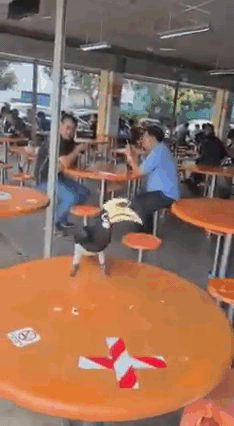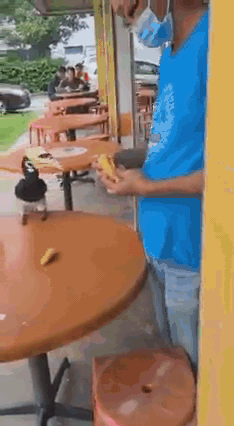Hornbills have always been a pretty sight to observe from afar, a prominent sign of Singapore's flourishing avian biodiversity.
A pair of hornbills, however, were recently spotted unnaturally close to humans at a coffee shop at Loyang Industrial Park.
Being fed banana
A video has been circulated around on social media over the weekend.
One Joseph Choo shared it in Facebook group Nature Society Singapore, showing the two birds were filmed hopping between tables and eating leftover food scraps.
This took place at an eatery at 64 Loyang Place.
Patrons nearby watch as the hornbills have their fill.
 Gif from Joseph Choo / FB
Gif from Joseph Choo / FB
Their unusual presence in an area with such high human traffic becomes clear mid-way through the video.
A man in blue approaches the table where the hornbills are standing on and starts to peel and feed them a banana.
The birds even seem accustomed to the man's presence, and do not startle or fly away from him.
One of the hornbills appears to be a female — it has a smaller casque with more black marks — and is being fed bits of banana by the other individual.
Once satiated, the female hornbill flies off.
 Gif from Joseph Choo / FB
Gif from Joseph Choo / FB
In his post, Choo condemned the act of the man in blue, stating that habitual feeding of the hornbills will cause them to "become bolder and this is bad".
Feeding wildlife is irresponsible and can lead to conflict
While this incident isn't the first time a hornbill has entered urban or residential areas — individuals have been seen stealing articles of human clothing and even gobbling up pet birds from their cage — it seems to be the first time the birds have been so openly fed.
In response to Mothership's queries, deputy chief executive of wildlife rescue organisation Acres, Kalai Vanan, said that the incident is a "sad reminder of how irresponsible actions of people can alter an animal's behaviour".
Once the hornbills become used to being fed by people, they might start actively approaching anyone who is eating to take their food.
These resultant interactions could result in incidences human-wildlife conflict, and members of the public might feel that the birds are becoming aggressive.
"A survey might be done to ask if they should be removed or tolerated. This is what has been happening for wild boars, macaques, pigeons, mynas and others," Kalai said.
Acres urges people to co-exist with wildlife by respecting their boundaries and appreciating them from a distance.
"We hope that everyone of us can come together to understand better why we should not feed wildlife directly or indirectly or perceive them as pests," he said.
He also urged the public to never feed wildlife and to report feeding of wildlife to the National Parks Board at 1800-471-7300.
Under the amended Wildlife Act, those caught feeding wildlife can be fined up to S$5,000 for first-time offenders and S$10,000 for second-time offenders.
Mothership has also contacted NParks for more information.
Related stories
Totally unrelated but follow and listen to our podcast here
Top photo from Joseph Choo / FB
If you like what you read, follow us on Facebook, Instagram, Twitter and Telegram to get the latest updates.
